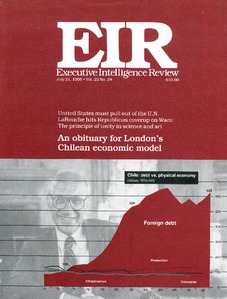Interviews
Yakubu Bako
by Uwe Friesecke and Lawrence Freeman
Mr. Bako, the military administrator for Nigeria’s Akwa Ibom state, speaks on development efforts there.
Gregory Agbonemi
by Uwe Friesecke and Lawrence Freeman
Group Captain Gregory Agbonemi, the military administrator of Nigeria’s Cross River state, says that in a nutshell, Nigeria’s problems are all economic.
Nedzib Sacirbey
by Umberto Pascali
The Bosnian ambassador-at-large and the spokesman of President Alija Izetbegovic in the United States, speaking on July 5 and 11 after the fall of Srebrenica, says, “We are asking for air strikes to defend the population.”
Lyndon H. LaRouche, Jr.
The American statesman and author sees the recent British Tory Party election, as a defeat for the Nazi wing.
Maximiliano Londoño Penilla
by Marianna Wertz
The leader of the Ibero-American Solidarity Movement in Colombia explains why Colombia must change its legal framework in order to win the war on drugs.
Raffaele Morini
by Claudio Celani
A former comrade of Enrico Mattei in the liberation war against Fascism.
Fulvio Bellini
by Claudio Celani
The author of a 1971 book, The Assassination of Mattei, recently gave key testimony to the state prosecutor of Pavia.
Reviews
Farrakhan Plays Mendelssohn
by Debra Hanania Freeman and Fred Haight
A review of the videotape, “For Love of Music-Farrakhan Plays the Violin.”
Departments
Report from Bonn
by Rainer Apel
Fiscal Constraints Block Employment.
Labor in Focus
by Anton Chaitkin
Challenge to the AFL-CIO Old Guard.
Andean Report
by Javier Almario
Military 1, Samper 0.
Editorial
Don’t Privatize Your Grandmother.
National Economy
An Obituary for London’s ‘Chilean Economic Miracle’
by Dennis Small and Cynthia R. Rush
After the Mexican miracle went kaputt, the Chicago School used-car salesmen have trotted out the neo-liberal Chilean success story for sale to a gullible public. The truth is that in 22 years of Friedmanite administration, Chile’s physical economy has declined in per capita and per household terms, while the bubble of foreign debt grew more than sixfold.
Economics
Food Cartel Companies Under Fire for Price-Fixing Scheme
by Jeffrey Steinberg
The action promises to have a dramatic impact on world food production—and U.S. politics.
Currency Rates
Its Granaries Full, India Looks To Become a Foodgrain Exporter
by Ramtanu Maitra
Business Briefs
Feature
The Principle of Unity of Science and Art
by Lyndon H. LaRouche, Jr.
In dialogue with collaborators of the movement to found the National Conservatory of Music, highlights the lessons of the unique Boys’ Choir of St. Thomas Church in Leipzig, where J.S. Bach spent some of his most productive years and where the entire Bach choral repertoire is still rigorously rehearsed and performed.
New Developments in ‘Furtwängler Case’
by Hartmut Cramer
As the substructure of financial policy is beginning to waver in Britain, visible cracks and fissures in the “superstructure” of cultural policy cannot fail to appear, and no issue is more significant than the reputation of the German orchestra director Wilhelm Furtwängler.
Farrakhan Plays Mendelssohn
by Debra Hanania Freeman and Fred Haight
The leader of the Nation of Islam astonished the world with a virtuoso performance of one of the most tender and compassionate pieces of music in the Classical repertoire, Felix Mendelssohn’s Violin Concerto in E minor, Op. 64. The videotape portraying the performance and the story that led up to it, is also a work of art.
Wagner and Mendelssohn
International
‘U.S. Must Pull Out from the UN,’ Says LaRouche
by Umberto Pascali
Documentation: Statements by Bosnian President Izetbegovic, Prime Minister Silajdzic, Pope John Paul II, and others.
Egypt, Algeria Steered toward Confrontations
by Muriel Mirak-Weissbach
African Patriots Gather in Paris
by Odile Mojon
Speaking at the Schiller Institute’s July 11 conference on Peace, Development, and Human Rights were the former President of Uganda and a top Nigerian delegation.
The Rajiv Gandhi Assassination: Will the Truth Prevail?
by Susan Maitra and Ramtanu Maitra
After four years, the tell-tale signs of a broader conspiracy behind the heinous crime emerge.
Venezuela-Brazil Ties Not on IMF’s Agenda
by David Ramonet
Documentation: Excerpts from the “Act of Miraflores,” issued by the Presidents of Venezuela and Brazil.
New Proof That Italian Industrialist Enrico Mattei Was Murdered
by Claudio Celani
More than 30 years after Mattei’s plane fell from the sky in 1962, a probe opens that could have big international repercussions.
International Intelligence
National
LaRouche Fires Salvo against Republican Waco Coverup
The opening issue of Lyndon LaRouche’s campaign for the 1996 Democratic Presidential nomination is a call for the congressional hearings on the 1993 Waco massacre to expose the real culprits in the Departments of Justice and associated private agencies.
Whitewatergaters Are Playing with Fire
by Edward Spannaus
Schumer Sets Stage for Attack on Clinton
Congressional Closeup
by William Jones
National News



